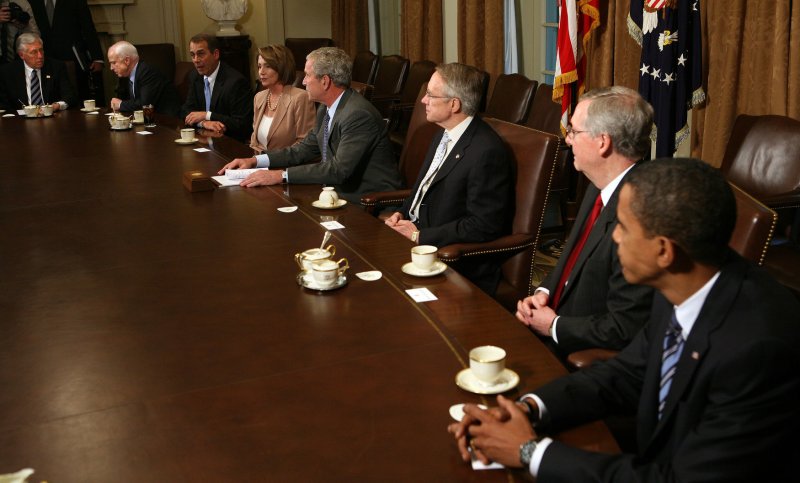1 of 4 | U.S. President George W. Bush prepares to host a meeting with Republican and Democratic Congressional leaders to discuss the current economic crises in the Cabinet Room of the White House on September 25, 2008. From left are House Majority Leader Steny Hoyer, D-MD, Republican Presidential Nominee Sen. John McCain, AZ, House Minority Leader John Boehner, R-OH, Speaker of the House Nancy Pelosi, D-CA, Bush, Senate Majority Leader Harry Reid, D-NV, Senate Minority Leader Mitch McConnell, R-KY, and Democratic Presidential Nominee Sen. Barack Obama, IL. The administration and Congress are nearing a deal on an economic bailout package. (UPI Photo/Kristoffer Tripplaar/POOL) |
License Photo
WASHINGTON, Sept. 26 (UPI) -- Congressional and Bush administration leaders said they hope they can fashion a Wall Street bailout plan before markets open Monday.
Negotiators planned to continue talks Friday on the $700 billion plan to stabilize U.S. financial markets after two sessions -- one at the White House that included the presidential candidates -- failed to produce consensus.
Congressional negotiators announced shortly before the White House meeting that agreement on principles for the bailout plan had been reached. However, during the White House meeting, House Minority Leader John Boehner, R-Ohio, said his caucus didn't agree to any deal and offered an alternative, creating the rift.
Democrats and Republicans were beginning to move toward a compromise version of Treasury Secretary Henry Paulson's original plan, but sources told the Los Angeles Times they didn't know whether it would get enough votes to pass.
"I'm seeing both Republicans and Democrats start to move toward voting for it," Rep. John Campbell, R-Calif., said. "I can't tell you that there's a majority at this point, but there's movement."
"Whatever is going to be done has to be done this weekend," said Rep. Lee Terry, R-Neb., who supports congressional action. "Allowing it to go beyond Sunday into Monday will devastate the markets."
The working proposal included features many critics said the original draft offered by Paulson lacked: compensation limits for executives of companies participating in the bailout, a provision for taxpayers to share in any profits from the sale of distressed assets and distribution of the $700 billion in three stages instead of one.
The alternative floated by conservative House Republicans would call for Wall Street firms to fund an insurance program to bail out less-solvent institutions by creating an insurance program for investment banks similar to the commercial bank plan. The plan also called for more deregulation, temporary tax breaks and relaxation of other rules to encourage investors to invest the financial system instead of using government funds.
Before the White House meeting ended, U.S. President George Bush warned participants about the impact on the U.S. economy if the measure failed, The Washington Post reported.
"If money isn't loosened up, this sucker could go down," Bush said, according to one person in the room.















